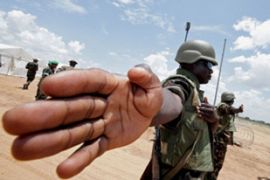Western nations tone down on Darfur
Western countries put forward a milder draft resolution on the Darfur conflict.

“We changed the text quite considerably. The tonality has changed … I think there is less threatening language in there. It’s more of a conciliatory text,” he said.
“I hope we’ll get to rapid closure.”
Further obstacles
Abdalmahmood Abdalhaleem, Sudan’s ambassador, has objected to the draft.
“It’s very ugly. It’s worse than the first one,” he said.
However, Andrew Natsios, US special envoy for Sudan, has said that Khartoum “should not have veto power.”
“They have made an agreement with Ban Ki-moon [UN Secretary General].”
“What’s important now is that we hold the Sudanese government for what they agreed to,” he said.
Meanwhile, the draft leaves intact a mandate that would allow the use of force that claims to ensure the security of UN personnel and humanitarian workers.
The new text said that it aims “to protect civilians under threat of physical violence”.
It would also allow the mission “to use all necessary means.”
The resolution is under Chapter 7 of the UN Charter.
Iraq scenario
Abdalmahmood Abdalhaleem said: “The way they put this resolution will make the force fight the Sudanese army.”
He said that the draft retained “the same inflammatory language, the same condemnation.”
“They want to transport the Iraqi scenario to us.”
A unanimous vote on the draft is unlikely.
Qatar, the only Arab member of the council, reflected Khartoum’s position.
Nasser Abdulaziz al-Nasser, Qatar’s ambassador, said that without Khartoum’s agreement, the resolution could not be implemented.
Rezlan Jenie, Indonesia’s ambassador agreed: “We would like to have the cooperation from Sudan, and cooperation only comes when they give the consent of the deployment.”
The operation is estimated to cost more than $2 billion in the first year, and is the latest effort to quell the violence in Sudan’s western region where more than 2.1 million people have been displaced and an estimated 200,000 have died.